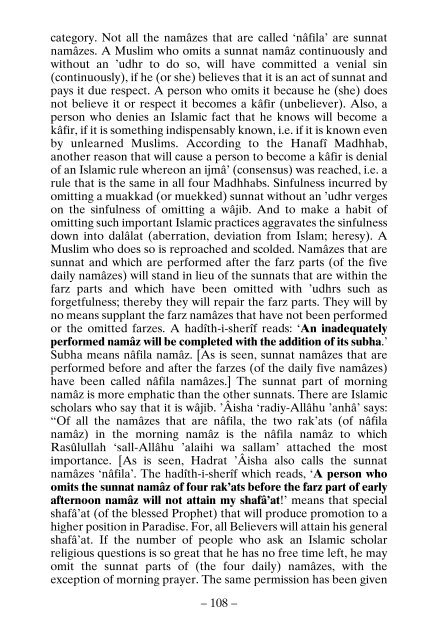O Son !
THE BOOK ‘O SON’ Al-hamdu lillâhi Rabbil ’âlamîn. Wa-s-salâtu wa-s-salâmu ’alâ Rasûlinâ Muhammadin wa Âlihi wa Sahbihi ajma’în. 1– O son! Collecting from books written by the scholars of the Hanafî Madhhab three hundred and sixty hadîth-i-sherîfs and forty-four khabars and also the seven essentials and the five rukns and the seven wâjibs and the fourteen sunnats and the twenty-five mustahabs and the fourteen mufsids of namâz, I have explained them for you. Adapt your acts and deeds to these teachings so that you attain fayz and nejât (salvation)! 2– Also for your information, I have collected a thousand and ninety âdâb (adabs) for you and for other young Muslims like you. If you adapt your actions and acts of worship to these teachings, they will be sufficient for you. If you laze, disobey Allâhu ta’âlâ and cease from these practices and manners, you will be afflicted with slavery and disgrace in the world and subjected to torment in the world to come. If you live up to them and advise your Muslim brothers to do the same, it will be useful for you. They will say blessings over you. And Haqq ta’âlâ will accept their invocations. For, a slave will be pardoned on account of another slave’s invocations for them.
THE BOOK ‘O SON’
Al-hamdu lillâhi Rabbil ’âlamîn. Wa-s-salâtu wa-s-salâmu ’alâ
Rasûlinâ Muhammadin wa Âlihi wa Sahbihi ajma’în.
1– O son! Collecting from books written by the scholars of the
Hanafî Madhhab three hundred and sixty hadîth-i-sherîfs and
forty-four khabars and also the seven essentials and the five rukns
and the seven wâjibs and the fourteen sunnats and the twenty-five
mustahabs and the fourteen mufsids of namâz, I have explained
them for you. Adapt your acts and deeds to these teachings so that
you attain fayz and nejât (salvation)!
2– Also for your information, I have collected a thousand and
ninety âdâb (adabs) for you and for other young Muslims like you.
If you adapt your actions and acts of worship to these teachings,
they will be sufficient for you. If you laze, disobey Allâhu ta’âlâ
and cease from these practices and manners, you will be afflicted
with slavery and disgrace in the world and subjected to torment in
the world to come.
If you live up to them and advise your Muslim brothers to do
the same, it will be useful for you. They will say blessings over you.
And Haqq ta’âlâ will accept their invocations. For, a slave will be
pardoned on account of another slave’s invocations for them.
Create successful ePaper yourself
Turn your PDF publications into a flip-book with our unique Google optimized e-Paper software.
category. Not all the namâzes that are called ‘nâfila’ are sunnat<br />
namâzes. A Muslim who omits a sunnat namâz continuously and<br />
without an ’udhr to do so, will have committed a venial sin<br />
(continuously), if he (or she) believes that it is an act of sunnat and<br />
pays it due respect. A person who omits it because he (she) does<br />
not believe it or respect it becomes a kâfir (unbeliever). Also, a<br />
person who denies an Islamic fact that he knows will become a<br />
kâfir, if it is something indispensably known, i.e. if it is known even<br />
by unlearned Muslims. According to the Hanafî Madhhab,<br />
another reason that will cause a person to become a kâfir is denial<br />
of an Islamic rule whereon an ijmâ’ (consensus) was reached, i.e. a<br />
rule that is the same in all four Madhhabs. Sinfulness incurred by<br />
omitting a muakkad (or muekked) sunnat without an ’udhr verges<br />
on the sinfulness of omitting a wâjib. And to make a habit of<br />
omitting such important Islamic practices aggravates the sinfulness<br />
down into dalâlat (aberration, deviation from Islam; heresy). A<br />
Muslim who does so is reproached and scolded. Namâzes that are<br />
sunnat and which are performed after the farz parts (of the five<br />
daily namâzes) will stand in lieu of the sunnats that are within the<br />
farz parts and which have been omitted with ’udhrs such as<br />
forgetfulness; thereby they will repair the farz parts. They will by<br />
no means supplant the farz namâzes that have not been performed<br />
or the omitted farzes. A hadîth-i-sherîf reads: ‘An inadequately<br />
performed namâz will be completed with the addition of its subha.’<br />
Subha means nâfila namâz. [As is seen, sunnat namâzes that are<br />
performed before and after the farzes (of the daily five namâzes)<br />
have been called nâfila namâzes.] The sunnat part of morning<br />
namâz is more emphatic than the other sunnats. There are Islamic<br />
scholars who say that it is wâjib. ’Âisha ‘radiy-Allâhu ’anhâ’ says:<br />
“Of all the namâzes that are nâfila, the two rak’ats (of nâfila<br />
namâz) in the morning namâz is the nâfila namâz to which<br />
Rasûlullah ‘sall-Allâhu ’alaihi wa sallam’ attached the most<br />
importance. [As is seen, Hadrat ’Âisha also calls the sunnat<br />
namâzes ‘nâfila’. The hadîth-i-sherîf which reads, ‘A person who<br />
omits the sunnat namâz of four rak’ats before the farz part of early<br />
afternoon namâz will not attain my shafâ’at!’ means that special<br />
shafâ’at (of the blessed Prophet) that will produce promotion to a<br />
higher position in Paradise. For, all Believers will attain his general<br />
shafâ’at. If the number of people who ask an Islamic scholar<br />
religious questions is so great that he has no free time left, he may<br />
omit the sunnat parts of (the four daily) namâzes, with the<br />
exception of morning prayer. The same permission has been given<br />
– 108 –

















